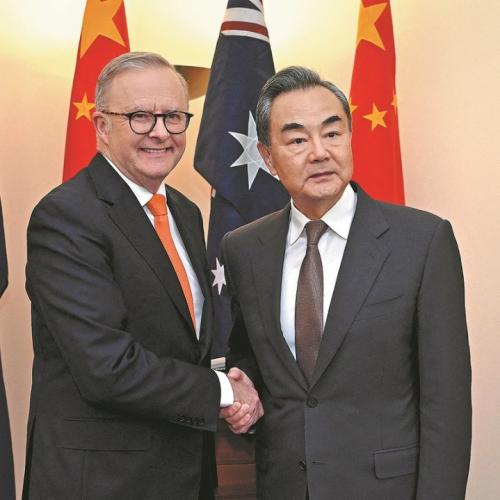



China-Australia relations are back on the right track, and there should be no further hesitation, no derailment and no backpedaling in advancing bilateral ties, Foreign Minister Wang Yi said on Wednesday.
He made the remark in Canberra during the seventh China-Australia Foreign and Strategic Dialogue with Australian Foreign Minister Penny Wong.
Observers said one of the highlights of the meeting was that the two sides agreed to resume and establish dialogues in various fields and let them work effectively. They said that Wang's remark is a reminder of how much Beijing values the hard-won rebound in China-Australia ties.
The Foreign Ministry said in a statement that Beijing and Canberra "agreed to advance more cooperation between the two countries' departments in charge of areas such as foreign affairs, economy and trade, science and technology, education as well as law enforcement, and to keenly consider dialogues on maritime affairs".
The two sides also agreed to take further measures to facilitate people-to-people exchanges between the two countries.
Wang said the ups and downs in China-Australia relations over the past 10 years have left behind lessons to be learned and cherished, which include upholding mutual respect, seeking common ground while shelving differences, and adhering to mutual benefit, self-independence and autonomy.
Since the two countries have a clear direction to advance their relations, they should try to move far, steadily and nicely, in that direction, he said.
"This is in the common interest of the two peoples and the common expectation of the region's countries," he added.
Wong said the two countries share close ties in history, trade and culture, they are comprehensive strategic partners and are located in the same region, and they should not allow differences to define the entire China-Australia relationship.
Wang elaborated on China's position on issues ranging from Taiwan, the Hong Kong Special Administrative Region and the Xinjiang Uygur and Xizang autonomous regions, to the South China Sea.
He emphasized that there are no grudges in history or conflicts of interest between China and Australia, and their common interests far outweigh their differences.
Observers noted that joint efforts of both sides in the past two years allowed China and Australia to break the ice and let their relationship set sail again. Exchanges and cooperation in various fields have been gradually restored.
When meeting with Wang on Wednesday, Australian Prime Minister Anthony Albanese underlined the need to identify as many areas of common interest as possible.
Australia speaks highly of China's achievements in development and poverty relief, and is willing to bolster high-level exchanges with China and deepen mutually beneficial cooperation in various fields, he said.
The ruling Australian Labor Party made a historic contribution to the establishment of diplomatic relations between the two countries. The Labor Party government will continue its efforts to advance the constructive development of Australia-China relations, Albanese said.
Chen Hong, professor and director of the Australian Studies Centre of East China Normal University in Shanghai, said, "Beijing asks for no backpedaling in the relations as bilateral ties hit a record low under the previous Australian administration, which inflicted damages that spilled from the political sphere into economic aspects."
The incumbent government is expected to further offset pressures from anti-China politicians as well as the United States to keep the relationship afloat, Chen said. "The two-way dialogues in various areas, if resumed as pledged on Wednesday, will mark a major improvement of the ties," he added.
Wang said that Beijing is willing to further prepare for high-level exchanges between the two countries.
The two nations should boost cooperation in conventional areas such as energy, minerals and agricultural products, and tap the potential for cooperation in areas such as new energy, the digital economy, green development and climate change, he said.
Wang's trip to New Zealand and Australia, which is scheduled to conclude on Thursday, is the second visit by a Chinese foreign minister to the two countries in the past seven years.
If you have any problems with this article, please contact us at app@chinadaily.com.cn and we'll immediately get back to you.